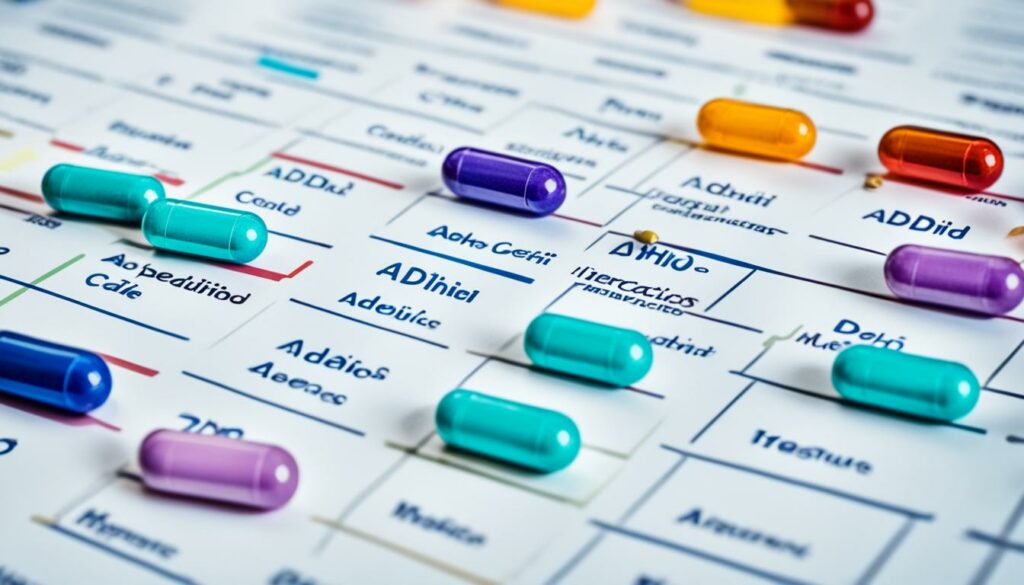Did you know that approximately 4.4% of adults in the United States are diagnosed with attention deficit hyperactivity disorder (ADHD)? That’s over 10 million people who struggle with symptoms such as poor concentration, impulsivity, and hyperactivity on a daily basis. Luckily, there are various medications available to help manage these symptoms and improve quality of life for adults with ADHD.
Key Takeaways:
- ADHD affects approximately 4.4% of adults in the United States.
- Medications can help manage ADHD symptoms and improve quality of life.
- Choosing the right ADHD medication is important and depends on individual factors.
- Stimulant medications are commonly prescribed and highly effective in treating ADHD.
- Nonstimulant medications are an alternative option for individuals who may not tolerate or prefer stimulants.
Types of ADHD Medications
When it comes to managing ADHD symptoms in adults, there are several types of medications to consider. These medications can help improve concentration and attention, making it easier to focus on tasks and activities. Let’s explore some of the commonly prescribed ADHD medications:
Stimulant Medications
Stimulant medications are often the first-line treatment for adult ADHD. They work by increasing the levels of certain chemicals in the brain that are responsible for attention and impulse control. Here are a few examples of stimulant medications:
- Adderall XR: Adderall XR is a long-acting formulation of Adderall. It provides sustained symptom relief throughout the day, allowing individuals to manage their ADHD symptoms effectively.
- Vyvanse: Vyvanse is another long-acting stimulant medication that is commonly prescribed for adult ADHD. It offers smooth and consistent symptom control with once-daily dosing.
- Concerta: Concerta is an extended-release formulation of methylphenidate. It provides sustained symptom relief for up to 12 hours, making it suitable for individuals who require all-day coverage.
Stimulant medications can be highly effective in managing ADHD symptoms, but they may not be suitable for everyone. In some cases, individuals may experience side effects or have certain medical conditions that make stimulant use problematic.
Nonstimulant Medications
For those who may not respond well to stimulant medications or prefer a nonstimulant approach, there are nonstimulant medications available as well. These medications work differently than stimulants but can still be effective in managing ADHD symptoms. One example of a nonstimulant medication commonly prescribed for adult ADHD is:
- Strattera: Strattera is a nonstimulant medication that affects the levels of certain chemicals in the brain to improve attention and impulse control. It may be a suitable option for individuals who cannot tolerate the side effects of stimulant medications or have other medical conditions that contraindicate stimulant use.
When considering ADHD medications, it is important to consult with a healthcare professional who can provide guidance and tailor the treatment plan to individual needs and preferences. They can assess the potential benefits and risks of each medication and make informed recommendations.
Now that we have explored the different types of ADHD medications available for adults, let’s dive deeper into their effectiveness in managing symptoms and the potential side effects associated with their use.
Effectiveness of ADHD Medications
When it comes to managing ADHD symptoms in adults, the effectiveness of medications plays a crucial role in improving daily functioning and quality of life. Research has shown that stimulant medications are generally more effective in treating ADHD in adults, adolescents, and children compared to nonstimulants. Specifically, medications like amphetamine and methylphenidate have demonstrated significant improvements in self-control, attention, working memory, and creative thinking.
Stimulant medications work by increasing the levels of certain neurotransmitters in the brain, which helps to regulate and improve attention and focus. These medications have consistently shown positive results in reducing hyperactivity, impulsivity, and improving overall cognitive function in individuals with ADHD.
Studies have demonstrated that stimulants can significantly enhance academic and occupational performance, as well as improve interpersonal relationships and overall well-being in adults with ADHD.
However, it is important to note that the effectiveness of medication can vary from person to person. Some individuals may respond better to one medication compared to another, and finding the most effective treatment option requires close collaboration with a healthcare professional. Factors such as personal medical history, lifestyle, and preferences should be taken into consideration when determining the optimal medication for adult ADHD.
Individualized Treatment Approach
Every individual is unique, and what works for one person may not work for another. The effectiveness of ADHD medications is highly individualized, and it’s crucial to find the right medication that provides the maximum benefit with the fewest side effects. Collaborating with a healthcare professional who specializes in ADHD can help guide the medication selection process. They can assess the individual’s specific needs, evaluate treatment response, and make adjustments as necessary.
While stimulant medications have shown to be effective for many individuals with ADHD, nonstimulant medications are a viable alternative for those who may not tolerate stimulant side effects or prefer a nonstimulant approach. It is important to discuss the potential benefits and risks of each medication option to make an informed decision.

| Medication Type | Effectiveness | Common Side Effects |
|---|---|---|
| Stimulant Medications (e.g., amphetamine, methylphenidate) | Generally more effective in managing ADHD symptoms | Decreased appetite, sleep problems, increased heart rate |
| Nonstimulant Medications (e.g., atomoxetine) | Alternative option for individuals intolerant to stimulants or prefer nonstimulant approach | Nausea, dry mouth, drowsiness |
Side Effects of ADHD Medications
When considering ADHD medications, it is important to be aware of potential side effects that may arise. As with any medication, ADHD medications can have both common and rare side effects. By understanding the possible side effects, individuals can make informed decisions and work with their healthcare professionals to manage any adverse effects.
The Most Common Side Effects of Stimulant Medications
Stimulant medications, such as Adderall XR and Vyvanse, are commonly prescribed to manage ADHD symptoms in adults. While these medications can be highly effective, they may also cause certain side effects. The most common side effects of stimulant medications include:
- Decreased appetite: Some individuals may experience a decreased appetite while taking stimulant medications. This can lead to weight loss or difficulty maintaining a healthy weight.
- Sleep problems: Stimulant medications can potentially disrupt sleep patterns, causing difficulties falling asleep or staying asleep. It is recommended to take these medications earlier in the day to minimize sleep disturbances.
- Increased heart rate: A temporary increase in heart rate is a possible side effect of stimulant medications. Healthcare professionals typically monitor heart rate regularly when prescribing these medications.
Possible Side Effects of Nonstimulant Medications
Nonstimulant medications, such as Strattera, are an alternative option for individuals who may not respond well to stimulant medications or prefer a nonstimulant approach. While these medications can be effective, they may also have potential side effects. Some possible side effects of nonstimulant medications include:
- Nausea: Nausea or an upset stomach may occur as a side effect of nonstimulant medications. Taking the medication with food can help alleviate this symptom.
- Dry mouth: Nonstimulant medications may cause dry mouth, which can be managed with increased water intake or the use of sugar-free candies or gum.
- Drowsiness: Drowsiness is another potential side effect of nonstimulant medications. It is important to avoid activities that require alertness until the individual knows how the medication affects them.
To gain a comprehensive understanding of the potential side effects of specific ADHD medications, it is essential to consult with a healthcare professional. They can provide detailed information and guidance tailored to the individual’s needs and medical history. Regular monitoring and open communication with healthcare professionals are crucial in managing any side effects that may arise while taking ADHD medication.

| Common Side Effects of Stimulant Medications | Possible Side Effects of Nonstimulant Medications |
|---|---|
|
|
Choosing the Right ADHD Medication for Adults
When it comes to managing ADHD symptoms in adults, choosing the right medication is crucial. However, with numerous options available, it can feel overwhelming to make a decision. To ensure the best outcome, several factors need to be taken into consideration.
Factors to Consider
When selecting an ADHD medication, it is essential to evaluate factors such as:
- Medical history: Understanding any preexisting conditions or allergies can help determine if certain medications are suitable.
- Lifestyle: Considering daily routines, work commitments, and personal preferences can contribute to finding a medication that fits seamlessly into an individual’s lifestyle.
- Side effects: Each medication has its own set of potential side effects. Discussing these effects with a healthcare professional can help weigh the benefits against the risks.
Working closely with a healthcare professional is paramount in the decision-making process. They have the expertise and experience to provide guidance and information about the different medication options available. By understanding an individual’s unique needs and goals, they can help identify the most suitable medication.
“The key to finding the right ADHD medication lies in a comprehensive evaluation of the individual’s medical history, lifestyle, and personal preferences.”
By involving a healthcare professional, individuals can navigate the complexities of ADHD medication options and make an informed decision that aligns with their specific circumstances.
Expert Advice and Guidance
Working with a healthcare professional who specializes in ADHD can provide invaluable insights and support during the medication selection process. Their expertise allows them to:
- Conduct a thorough evaluation: A healthcare professional can gather all relevant medical information and assess an individual’s symptoms and overall health.
- Provide medication education: They can offer detailed explanations about different medications, their mechanisms of action, and potential side effects.
- Monitor progress: Ongoing communication and follow-up appointments help track the effectiveness of the chosen medication and make any necessary adjustments.
With the help of a healthcare professional, individuals can feel confident in their decision and optimize their ADHD management.

| Medication | Benefits | Potential Side Effects |
|---|---|---|
| Adderall XR | Provides extended symptom relief | Decreased appetite, sleep problems, increased heart rate |
| Vyvanse | Long duration of action, once-daily dosing | Decreased appetite, sleep problems, increased heart rate |
| Concerta | Effective in managing ADHD symptoms | Decreased appetite, sleep problems, increased heart rate |
| Strattera | Nonstimulant alternative | Nausea, dry mouth, drowsiness |
Note: The information provided above is for illustrative purposes only. It is essential to consult a healthcare professional for personalized recommendations and guidance.
Comparing ADHD Medications for Adults
When it comes to treating adult ADHD, there are several medications available. To make an informed decision, it is essential to compare these medications based on factors such as duration of action, dosing schedule, and the potential for misuse or dependence.
Long-acting stimulant medications like Adderall XR and Vyvanse provide extended symptom relief with once-daily dosing. These medications can be beneficial for adults who need sustained support throughout the day. On the other hand, nonstimulant medications like Strattera may be a better option for individuals who cannot tolerate the side effects of stimulants.
Comparison of ADHD Medications
| Medication | Duration of Action | Dosing Schedule | Potential for Misuse or Dependence |
|---|---|---|---|
| Adderall XR | Up to 12 hours | Once daily | Potential for misuse and dependence |
| Vyvanse | Up to 14 hours | Once daily | Lower potential for misuse and dependence compared to other stimulants |
| Strattera | Up to 24 hours | Once daily | Low misuse and dependence potential, as it is not a stimulant |
The choice of medication for adult ADHD should be based on individual needs and preferences. It is crucial to consult with a healthcare professional who can provide personalized guidance and help you evaluate the benefits and potential risks of each medication option.
Best Medication for Adult ADHD
Determining the best medication for adult ADHD is a highly individualized process. It involves considering various factors such as medication effectiveness, tolerability, and personal preference. While stimulant medications like Adderall XR and Vyvanse have shown high efficacy in improving ADHD symptoms in adults, nonstimulant medications like Strattera may be a better choice for certain individuals who prefer a nonstimulant option or have coexisting conditions that contraindicate stimulant use.
Stimulant medications such as Adderall XR and Vyvanse are commonly prescribed for adult ADHD due to their effectiveness in enhancing concentration and reducing impulsivity. These medications work by increasing the levels of certain neurotransmitters in the brain, helping to improve focus and self-control. Studies have shown that stimulant medications can significantly reduce ADHD symptoms, improving overall functioning and quality of life.
While stimulant medications can be highly effective, they may not be suitable for everyone. Some individuals may experience side effects, such as increased heart rate, decreased appetite, or difficulty sleeping. In addition, individuals with certain medical conditions, such as cardiovascular issues or a history of substance abuse, may not be able to take stimulant medications. In these cases, nonstimulant medications like Strattera can be a valuable alternative.

Strattera is a nonstimulant medication that works by affecting the levels of norepinephrine in the brain. It has been shown to improve ADHD symptoms, including inattention, impulsivity, and hyperactivity, without the potential for abuse or dependence associated with stimulant medications. Strattera may be a suitable choice for individuals who cannot tolerate the side effects of stimulant medications or prefer a nonstimulant approach.
Ultimately, the choice of the best medication for adult ADHD should be made in consultation with a healthcare professional. They can provide personalized guidance based on an individual’s specific needs and preferences, taking into account factors such as medical history, potential side effects, and treatment goals. By working closely with a healthcare professional, individuals can make an informed decision and find the medication that is most effective and well-suited to their unique circumstances.
| Medication | Effectiveness | Tolerability | Personal Preference |
|---|---|---|---|
| Adderall XR | Highly effective | Side effects may occur | Individual preference may vary |
| Vyvanse | Highly effective | Side effects may occur | Individual preference may vary |
| Strattera | Effective | Generally well-tolerated | Suitable for those who prefer a nonstimulant option |
Conclusion
In conclusion, finding the optimal medication for adult ADHD requires careful consideration of individual needs and preferences. One option to consider is stimulant medication, such as Adderall XR or Vyvanse, which have been shown to be effective in managing ADHD symptoms. These medications work by increasing the levels of certain chemicals in the brain that help with focus and attention.
However, stimulant medications are not suitable for everyone. Some individuals may experience side effects like decreased appetite, sleep problems, or increased heart rate. In these cases, a nonstimulant medication like Strattera may be a viable alternative. Nonstimulant medications work differently by increasing the levels of a different brain chemical called norepinephrine.
When deciding on the optimal medication for adult ADHD, it is important to work closely with a healthcare professional. They can assess your specific needs, medical history, and lifestyle to recommend the best option for you. By considering the medication’s effectiveness, tolerability, and personal preference, you can make an informed decision that aligns with your ADHD management goals. Remember, individual responses to medication can vary, so ongoing communication with your healthcare professional is key to finding the optimal solution.
